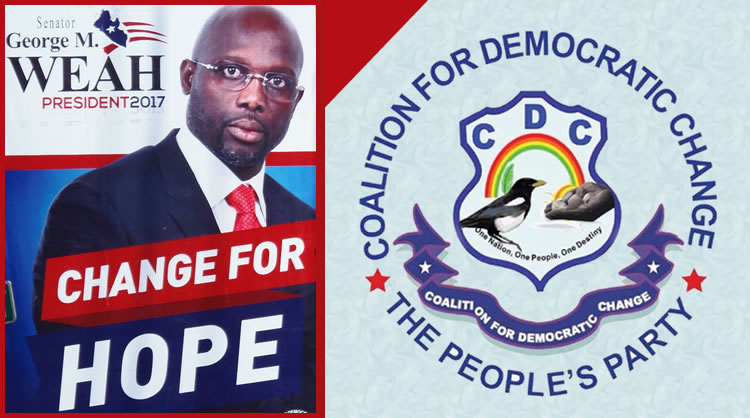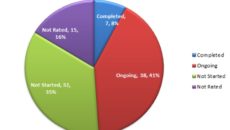The rhetoric of change is a powerful political tool. In the hands of skillful politicians and their surrogates, it can move societies in uncertain directions. And this is not an overstatement. For many the world over, the 2008 election of Barack Obama as the first black president of the United States, based upon his ‘change’ message of ‘Yes We Can!’ offers ample proof.
Perhaps sensing the power of this tool, the Coalition for Democratic Change in Liberia’s ongoing presidential elections has added another ‘change’ word to its numerous political mantras.
‘Change for Hope’ has become the party’s newest campaign slogan, not that many voters even understand what it really means, nor has the CDC offered any concrete explanation. Liberians are nevertheless moving on to the second round of voting on November 7. For such, it is a state of affairs of elections in Liberia and for Africa at large at a chance to witness democratic and peaceful change.
As a concept, change inspires a certain feel-good sentiment of progress and advancement. But too often the reality is different. And little do we understand the complexity of the phenomenon, and why human beings are often reticent about it.
There is a reason change is often disconcerting because it is too often disruptive and unpredictable. For one thing, change does not always guarantee progress, nor does it always lead to it. This sober reality sits at the heart of disappointments and heartbreaks felt by many change agents who misunderstand its role in human sociology and history.
This is not to say that conditions of injustice and backwardness must be allowed to linger for a day longer or that they aren’t justifiable reasons for change. Instead, it is simply to say that mere change does not automatically supplant such backwardness and injustice to usher in desired progress.
Change isn’t necessarily self-fulfilling, and those opposed to change aren’t always anti-progressive. Perhaps they’re simply unsure and unconvinced about its direction. These are the ones who must, therefore, be most forcefully persuaded of its necessity to embrace it.
Like the change in seasons and time, change can also be cyclical. Examples of cyclical change can be found in the fashion industry where every once in a while, we return to a previously ‘changed’ state of culture. Suddenly, the styles of the 60s and 70s become voguish once again.
Therefore, it is possible to return to a long-lost moment in the past, not merely for its romanticism and nostalgic sentiments; but because that previous moment in time represents a better and more worthwhile state of existence.
In the case of Liberia, I have in mind that moment in the 1970s and early 1980s when the John F. Kennedy Medical Center in Monrovia was the best referral hospital in West Africa, with the full range of specialists, and diagnostic and surgery facilities. Sadly, today malaria, typhoid, and other preventable and curable bacterial infections top the list of the most lethal killers at JFK.
Perhaps the most disconcerting aspect of change comes about when it assumes a certain uncontrolled rapidity. By that, I mean a constant, repetitive and never-ending process of transformation such that by its very temporariness and transient nature, it becomes uncomfortably arbitrary and disruptive. Within the lives of ordinary human beings, such rapidity gives rise to feelings of uncertainty, instability, fatigue, and vulnerability beyond continence.
Under such conditions, deep yearnings for stability, perpetuity, persistence, continuity, and constancy suddenly become bulwarks standing in the way of change. This may have been the feeling which engulfed Liberia’s founding fathers in the early days of the republic when presidential elections occurred every two years. A president didn’t fully settle into office, and suddenly, it was time to leave.
To address this unsettling rapidity, presidential term limits were thus extended to four years, then later six, then eight, and back to six again, all in an attempt to strike the right balance. In these elections, Liberians do not yearn for change merely for its own sake.
The advocates of change in Liberia have not fully clarified in any serious way what changes they seek, what future they promise; or for that matter, how that future will be attained and sustained. Instead, what we have is an effort to entice unsuspecting voters with the sentimentalities of progress and betterment, by invoking change – of newness and difference – as a worthwhile promise, ignorant themselves of the retrogressive possibilities such change may engender.
I’ve seen this pattern of retrogressive political transition before, especially since the military coup of 1980, all in the name of change. In its current configuration, the CDC is not a viable vehicle for progressive change in Liberia, and neither is its leader. It is time its supporters stop appealing to empty sentiments.



